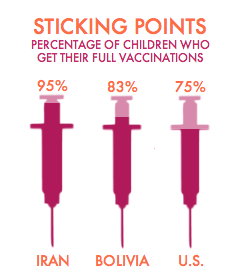
May 15, 2013 | Violence Against Women
Sex Trafficking Hits Home
She's fighting the scourge right here in the USA.
Malika Saada Saar, founder of The Human Rights Project for Girls.
By Sarah J. Robbins
When most people hear about the horrors of sex trafficking and exploitation, they think of faraway countries like India or Cameroon. But just last week, longtime women's advocate Malika Saada Saar sat down with six young girls who were bought and sold for their bodies right in our own backyard. "They were from Los Angeles," she says. "Born and raised—and trafficked—in Los Angeles."
American girls ages 16 to 19 are the prime victims of rape, attempted rape, and sexual assault, according the U.S. Bureau of Justice, and one in four will report a sexual assault by age 18, says one study. These shockingly high rates are close to the level of sexual violence in some parts of Africa, Latin America, and Asia, where such attacks are acknowledged as a human rights issue. But for American girls, "their conditions of poverty, rape and sexual violence are excluded from a human rights framework," says Saada Saar. "[They're] reduced instead to conversations of cultural pathology and crime."
Saada Saar is aiming to ensure that the plight of American girls is no longer ignored. A lawyer by training, she started The Human Rights Project for Girls (Rights4Girls) to give voice to these invisible girls.
The new organization works in part by empowering survivors of domestic sex trafficking to become advocates for themselves. Through one-week intensive programs, survivors learn about the public policy process and gain the public speaking and social media skills necessary to bring their own stories to light. "We are purposely focused on small groups of girls who are trained and prepared to speak truth to power," says Saada Saar, who in 2001 founded the Rebecca Project for Human Rights, with which she is no longer affiliated. "We have trained and worked with over 50 girl survivors in the last year."
Though change starts with the survivors, the work of Rights4Girls expands well beyond, to the halls of Congress and the White House, where for years Saada Saar has been lobbying to include American girls in the conversations about violence against women. It’s working: In February, an amendment that Rights4Girls helped to develop in partnership with Senator Rob Portman (R-Ohio), which recognizes child victims of trafficking as victims of sexual violence—and therefore gives them access to the same resources as other survivors—passed unanimously in the Senate.
To learn more, go to www.rights4girls.org.
Sarah J. Robbins is the co-author of Keeping Hope Alive, the memoir of Somalia’s Dr. Hawa Abdi.